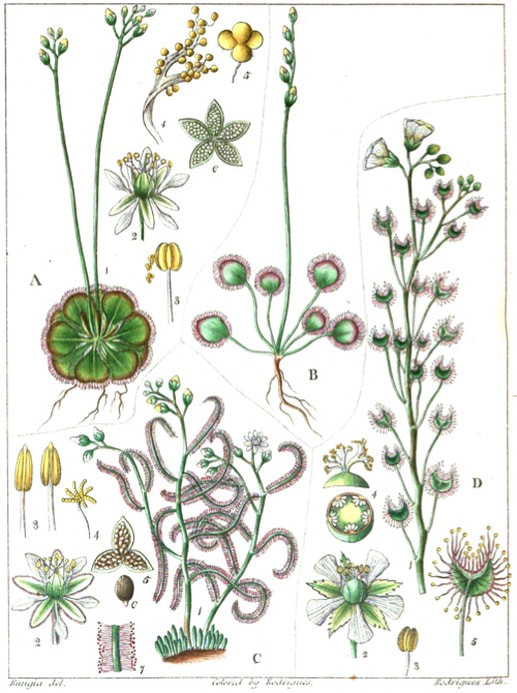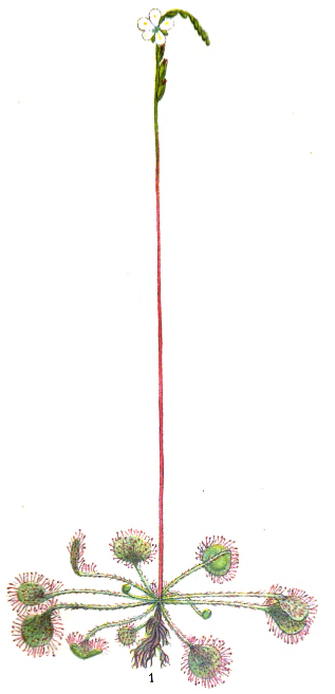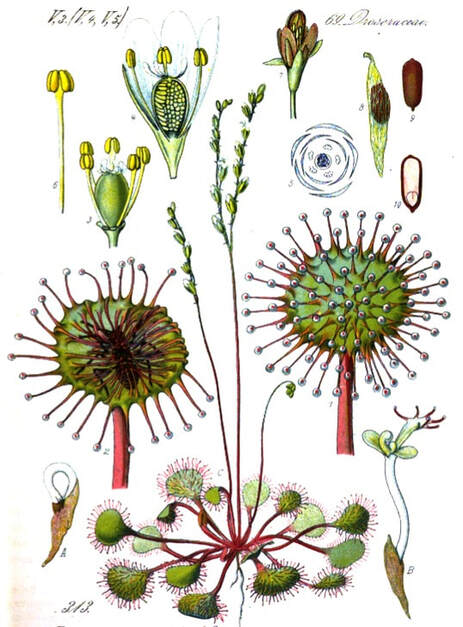Drosera, Sundew
Ros Solis, Lustwort, Herba Rorellae
Bdud rtsi rtag ngu བདུད་རྩི་རྟག་ངུ་ (Tibet)
Bdud rtsi rtag ngu བདུད་རྩི་རྟག་ངུ་ (Tibet)
|
A. D. burmanni; B. D. intermedia; C. D. indica; D. D. peltata
Illustrations of Indian Botany, Wight, 1840 |
D. rotundifolia
Medicinal Plants, Millspaugh, 1892 |
D. rotundifolia
Flora von Deutschland, Kohler, 1886
Flora von Deutschland, Kohler, 1886
Botanical name:
Drosera spp.
1. D. rotundifolia (Common, European or Round-leaved Sundew)
2. D. peltata (Pale Sundew)
3. D. intermedia (Medium Sundew)
Round and Long-leaved varieties were known.
Parts used:
Whole plant
Temperature & Taste:
Neutral/slightly Warm, dry. Bitter, Pungent, Sour. Slightly Toxic.
Classifications
3K. EXPECTORANT
TCM:
P. Clear Phlegm
Drosera spp.
1. D. rotundifolia (Common, European or Round-leaved Sundew)
2. D. peltata (Pale Sundew)
3. D. intermedia (Medium Sundew)
Round and Long-leaved varieties were known.
Parts used:
Whole plant
Temperature & Taste:
Neutral/slightly Warm, dry. Bitter, Pungent, Sour. Slightly Toxic.
Classifications
3K. EXPECTORANT
TCM:
P. Clear Phlegm
ADVERTISEMENT:
Uses:
1. Warms and Strengthens the Kidneys:
-impotence, lack of sex drive associated with cold and weak Kidneys
-juice and herb have traditionally been used as an Aphrodisiac as well as being used as a tonic in old age and to promote longevity
-rheumatic pain of the back and legs (lower body) associated with Cold, Damp, and Weak Kidneys. (TCM)
2. Stops Cough, Clears Phlegm:
-chronic coughs and wheezing; chronic Bronchitis or Asthma
-Whooping Cough; Cough of Measles.
-Grieves also lists it for ‘incipient phthisis and chronic Bronchitis’
3. Settles Wind, Comforts the Heart:
-Epilepsy; Hypertension
-Arteriosclerosis in modern times
-Temporal Headache (TCM)
4. Resists Poison:
-Plague, Fevers and Influenza. (Salmon)
5. Warms the Stomach:
-weakness or irritability of the stomach, nausea and upset stomach.
-stomach Ulcers and Gastritis.
6. Externally:
i. the fresh leaves were bruised with salt and applied to raise blisters.
ii. the distilled water is good externally for old Ulcers and Fistulas, and held in the mouth, it cures toothache (from cold).
iii. ‘The juice destroys Warts and Corns, if a little be frequently put upon them’. (Culpeper)
Dose:
... available in PRO version
Comment
... available in PRO version
... available in PRO version
Comment
... available in PRO version
Main Combinations:
1. Whooping Cough, Bronchitis:
i. Weiss suggests Thyme and Sundew to be synergistic in effect when used for the Lungs; especially for Whooping Cough
ii. Sundew, ... available in PRO version
iii. Sundew with ... available in PRO version
iv. Sundew with ... available in PRO version
v. Sundew with ... available in PRO version
vi. Sundew with ... available in PRO version
2. Asthma, Sundew ... available in PRO version
3. Asthmatic Bronchitis, Sundew with ... available in PRO version
4. To Warm the Kidneys, Sundew with ... available in PRO version
5. Consumption, to preserve from Epidemics, and for Palpitations, Sundew with ... available in PRO version
ADVERTISEMENT:
Cautions:
1. Avoid overdose or long-term use
2. Not suitable for Yin deficiency or Yin deficient Heat conditions.
Main Preparations used:
Tincture, Distilled Water (Simple and Compound)
1. Avoid overdose or long-term use
2. Not suitable for Yin deficiency or Yin deficient Heat conditions.
Main Preparations used:
Tincture, Distilled Water (Simple and Compound)





